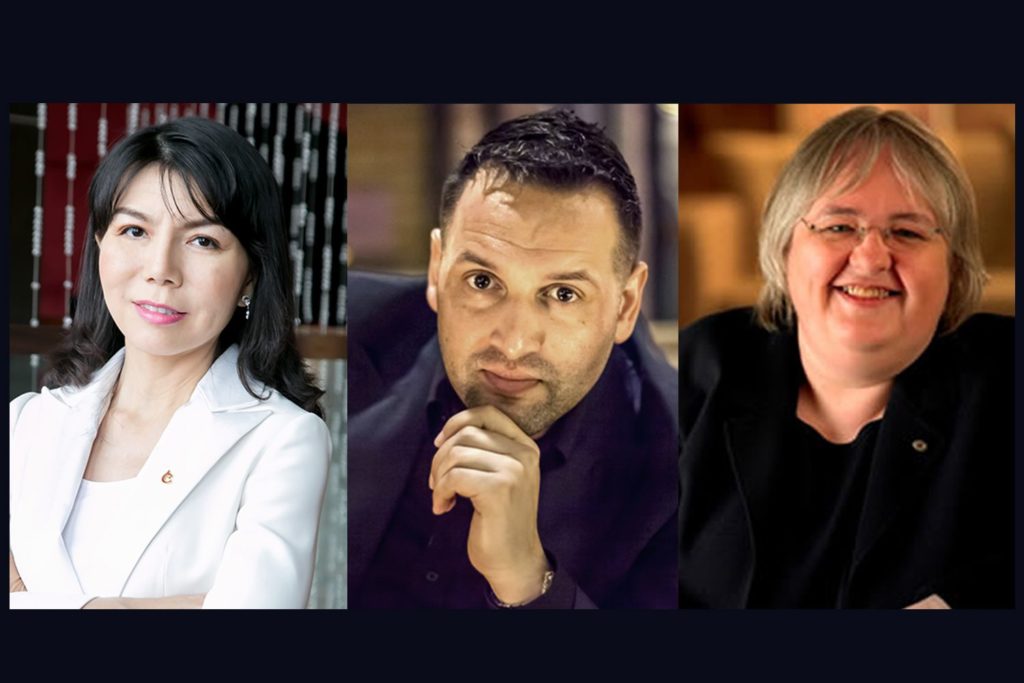
Getting an overseas post is a major life event. You’ve usually been offered such a position because you’ve excelled in your job and people have faith that you can be a great asset to the business overseas. While the thought of traveling and working in a far off land might seem like a dream to some, the reality can be far from a dream – and for some it can become a nightmare.
In today’s ‘Conversation’, we’re joined by a panel of experienced executives that have all proven themselves working in cross cultural work environments:
Rujapa Hamnilrat: Vice President, Centara Hotels and Resorts.
Stuart Jay Raj: Managing Director, Jcademy.com / Kognisens.
Tracey Lloyd: Vice President of Talent, Minor Hotels
What are the most common issues encountered when new executives / hoteliers from the west come to join the team in Asia?
Rujapa Hamnilrat: Naturally, communication is an area where issues tend to arise. It may not be related to working in different languages themselves, but rather tends to be as much about the different ways and styles of communication from one culture to another. Asian people, even those in the new generation, tend to speak in a less direct way than their western counterparts in talking with a manager or a more senior person. But this less direct communication style doesn’t necessarily mean that the speaker accepts or is in agreement with something. Asians in general tend to be somewhat more shy in their communication style; they typically share less personal information and are less accustomed to voicing opposing viewpoints, so it can take some time for newly arrived expats to adjust to the differing ways of communication.
Sometimes expat executives perceive a situation one way with their local team, but they may be getting a less-than-full picture of the situation simply because there may be less actual communication from their local employees. This can happen with new executives when they first come to work in an Asian culture, but communication will improve once they have had some time to become familiar with the culture, the local ways of doing things, and grow the level of trust in relationships over time.
Tracey Lloyd: Overall, executives adapt very well as they come with an open mind-set and a certain level of excitement to work in such a dynamic region as Asia. If any small issues are encountered, it’s usually oriented around adapting to the local culture. It is possible that the new team members have visited the country of employment on a vacation and believe they are well versed on the intricacies of their new home and this can lead to a few teething problems along the way. Sometimes there are assumptions made and perhaps communication difficulties. Overall, with the right mind-set, people adapt quick and come to truly appreciate their new home.
Stuart Jay Raj: ‘Skewed Information’ would have to be one of the biggest causes of grief for both locals and foreign executives / hoteliers when they come to join a team in Asia. Usually, if a foreigner has moved to the country to take up an exec position, they must have done something right where they were before to warrant them getting a new overseas posting. Very often (but not always), with that also comes a degree of ego. When they arrive at their new post, where these people may have once been Superman back home, applying their same management styles and reacting to situations like they normally would works like Kryptonite against them.
The information that they are receiving and interpreting regarding what’s going goes through filter of what they ‘think’ is going on based on their own experience back home. What they assume is the cause of ‘x’ issue might not be what they think, and then when they try and address it like they would back home, it comes back to bite. If they don’t speak the local language, it compounds it as they will usually be relying on one or two people (PA / Secretary and or HR Director) to communicate to them what is going on on the ground. That means that all the information reaching them has been filtered through those people’s interpretation and agendas – either intentionally or unintentionally. The result – an exec flailing in a foreign ocean, trying to understand what’s going on, wondering why they can’t get things to happen the way they should and the locals getting frustrated that the new person is totally detached from what’s going on, doesn’t understand what they need and fails to provide strong leadership for them.
What are some of the misconceptions that people in the west hold of Asia?
Rujapa Hamnilrat: Some believe that Asians are more easily accepting of things and more agreeable to what is being said. Expat executives accustomed to more advanced levels of technology or westernized business practices might try to introduce the same ideas they have used before and try to apply the same concepts to local work situations in Asia early on, before they’ve had much time to gain an understanding of the local culture. This can complicate the process of introducing news systems or work processes.
Actually, expat executives can get some very valuable insight and good ideas from their local colleagues; the key is patience, open-mindedness and a willingness to listen. Language skills may further limit the conversation, but that doesn’t mean they local person doesn’t have something worthwhile to share, so expats may be better served by being more patient and willing to listen, and to make an effort to learn the local language.
Tracey Lloyd: I have been working overseas now for more than 10 years and have seen such misconceptions lessen over that time. With access to more information online, most Executives carry out lots of research and preparation prior to arriving in a new country. If people transfer within a company, there would be an onboarding programme that would help set the person up for success and enable them to settle into their new home, quickly.
Stuart Jay Raj: That Asia is mysterious and you’ll just never understand how things work. Sometimes the locals also use this to their advantage, using the excuse ‘You will never understand – it’s just like that’ to justify what can sometimes be behaviour or practices that would in fact not be tolerated by a local company’s management team. As long as hierarchies and lines of respect are understood, a lot of the ‘mysterious Asian fog’ is easily lifted.
For Executives that come with their spouse, do you have a program to help them adjust as well? What should they be prepared for?
Rujapa Hamnilrat: A cross-cultural training program is very useful for new expats and their spouses. Understanding culture and a bit of the local language for daily life are good things to help prepare for the adjustment. Most large cities have expat communities and social circles that we encourage participating in. The most important thing is that they should be open minded and keen to learn, be flexible to adjust, and have a sense of excitement about living and working in a different part of the world. I see many expats really enjoy living in Asia, but some expats have more difficulty adjusting to various aspects of their assignment, whether it is differences in food, living in cities that are more crowded or a bit more chaotic than they are accustomed to, or simply getting acclimated to a hotter climate.
Tracey Lloyd: At the interview stage, we always ask ‘what does your spouse need to ensure their comfort?’
So we try and identify early on what the spouse / family needs are. We would put the family in touch with a real estate agent as an example so that early preparations can be made to find the right accommodation solution. In the interim period when the family arrives, we try and provide whatever they may need for that initial period whilst they wait to confirm their accommodation and wait for their belongings to arrive. Overall, our approach is to customize our welcome programme to the needs of the new executive and his or her family.
Stuart Jay Raj: Spouses need to be prepared to have new pressures put on their relationship. It’s often a big hit to the ego for ladies who would have always turned heads back home, when they fail to cause anyone to even bat an eyelid on the ground in Asia. Meanwhile, their middle aged balding husband all of a sudden becomes a celebrity walking down the street or in the office, perhaps with a hot young secretary to boot that will be willing to work overtime to get the job done. Unless the relationship between you and your spouse is actively maintained, things can deteriorate fast.
In a scenario where someone has expat experience and can function on the ground in Asia, but may lack some of the job criteria is going for the same position where someone else ticks all the job criteria, but lacks overseas experience – who would be a better fit for the job?
Rujapa Hamnilrat: I would say normally we prefer a person with prior experience working abroad or those who have had a regional/global role working with people from different cultures. This provides some evidence that they have cross-cultural experiences and an ability to adjust to a new environment. However, I have had the experience with a few expats who have been able to adjust very well even during their first time in Asia. Normally when I interview expats, I will check their ability to work with different types of people, their degree of respect toward new cultures, and their flexibility to adjust themselves to new environments.
Tracey Lloyd: I think experience in the country of operation is always a benefit. If we are entering a new country for the first time for example, the knowledge that someone who has experience in that country can bring to the table is truly invaluable. I think there are also occasions when someone has experience in one Asian country, this would set them up for success in a second Asia country – moving from Thailand to Malaysia or Vietnam as an example, is an easy transition. Ideally, we would prefer to identify local talent and then give them the opportunity to develop their careers internationally before returning to their home countries.
Stuart Jay Raj: I once had a blue-chip client call me in, saying it was an emergency situation. They had just hired a new director to head up a new project that was worth around $100 million. The guy’s resume was fantastic and had scored some big wins in his past roles hence getting headhunted to this position. He was a vegetarian, and every day where normally all the team would sit and eat together, his wife brought his lunch from home and he would sit at a separate table, not sharing in any of the conversation – or food with is team. They quickly turned on him thinking he thought he was above them and they started to petition to have him removed. I ended up spending 3 days with the guy and he spent most of the time telling me how stupid his team were and how things have to change to be done the way he likes it to be done if things are going to work. In the end he and his management made a mutual decision that he wasn’t suited to the post – and from then on, they had an unwritten policy that they would not introduce any more foreigners in to leadership positions if they held religious or other beliefs that would limit their ability to really integrate with their teams. In the west, a company might not get away with that, but this is Asia and the compliance and political correctness of the west doesn’t always apply.
How important is the learning of the local language in the country that you are in? Do you have any program that helps your executives get the basics? Has it been successful?
Rujapa Hamnilrat: It is not a must that one has to understand the local language at the beginning, but it is expected when you work in the country for some time. This shows an expat’s interest in the country and its people.
We encourage our expats to speak some Thai every day with the local staff. We even have a target that expats must learn a new Thai word every day. Yes, it was successful in many regards but to sustain the success, I think it depends on an individual’s enthusiasm and whether he or she truly has the interest.
Tracey Lloyd: I think learning how to communicate effectively is important and encourages a broader understanding of the host country. Learning the language would be ideal and we can provide on-line support for overseas executives. In some of our locations we also have the option of local language tuition to ensure that the executive has all the support they require on their journey of employment with our company.
Stuart Jay Raj: Five of the top issues that locals feed back to me from the ground right across Asia regarding foreign managers are 1. Don’t Say ‘We don’t do it like that back home’, 2. The Boss needs to get out of his / her Expat Bubble more, 3. Don’t mistake fluency in English for intelligence, 4. Be Willing to Learn – and show it and 5. Don’t force locals to speak in English together during work time. (Before any expat execs start jumping up and down in disagreement, hear me out first – I actually put a clip together to explain why). From experience, if the foreign executive does take the plunge and really makes an effort at learning the local language, those top five issues pretty much dissipate.



